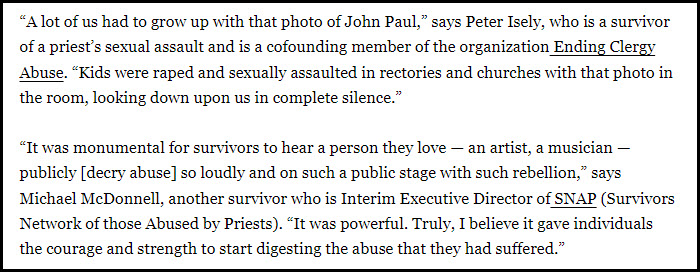This is the story of a Prince, a Pope and a young woman.
Sinéad O’Connor was 23 when her second album I Do Not Want What I Haven’t Got rocketed up the charts, mostly based on the strength of her cover of Prince’s song “Nothing Compares 2 U.”
She didn’t just cover Prince’s song… she made it her own.
Sinéad was just 25 when she appeared on Saturday Night Live and performed Bob Marley’s “War.” She didn’t just cover Marley’s tune, she made it her own… by changing the lyrics to reference child abuse. Oh, and as we all know, she did so while tearing up a photo of the Pope.
For doing so, she was “cancelled” before cancel culture was even a thing.
In a post-Spotlight world, when we know much more about the child abuse being committed by members of the clergy, and about the coverups by the higher-ups, I hope people can better understand the motives of Ms. O’Connor. She wasn’t just protesting clergy abuse either, but child abuse in general. It was something she had firsthand experience with.
The photo itself had hung on the bedroom wall of O’Connor’s mother, who O’Connor later said had physically and sexually abused her as a child.
Source: this New York Times article
At 14, Sinéad was sent to live at one of the infamous Magdelene Laundries in Ireland.
“We were girls in there, not women, just children really. And the girls in there cried every day. It was a prison. We didn’t see our families, we were locked in, cut off from life, deprived of a normal childhood. We were told we were there because we were bad people. Some of the girls had been raped at home and not believed.”
Sinead O’Conner in this Irish Times article
Nine years after she tore up his photo, Pope John Paul II sent an email apology to the victims of sexual abuse perpetrated by priests and other clergy in Australia and the surrounding region, acknowledging the scandal for the first time in his papacy.
In 2010, Pope Benedict XVI said in an 18-page letter that he was “truly sorry” for the abuse suffered by victims at the hands of Catholic priests in Ireland, O’Connor’s home country.
Source: CNN article
Perhaps with the benefit of hindsight, we can see Sinéad’s protest as a clarion call… and we can see Sinéad as more prophet than pariah.

In a tribute to O’Connor following her death, Irish comedian and actress Aisling Bea wrote on Instagram that “everything she stood up for and against then, including racism in the music industry, has been proved to have been needed and right…She was the original truth sayer who wouldn’t go easy into the night.”
Source: CNN article
“Everyone wants a pop star, see? But I am a protest singer. I just had stuff to get off my chest. I had no desire for fame.”
Sinéad O’ Connor

You done said…